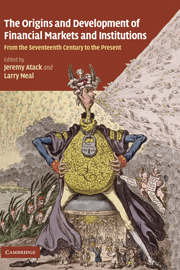 The Origins and Development of Financial Markets and Institutions
The Origins and Development of Financial Markets and Institutions Book contents
- Frontmatter
- Contents
- List of figures
- List of tables
- List of contributors
- Preface and acknowledgments
- 1 Financial innovations and crises: The view backwards from Northern Rock
- 2 An economic explanation of the early Bank of Amsterdam, debasement, bills of exchange and the emergence of the first central bank
- 3 With a view to hold: The emergence of institutional investors on the Amsterdam securities market during the seventeenth and eighteenth centuries
- 4 Was John Law's System a bubble? The Mississippi Bubble revisited
- 5 Sir George Caswall vs. the Duke of Portland: Financial contracts and litigation in the wake of the South Sea Bubble
- 6 The bell jar: Commercial interest rates between two revolutions, 1688–1789
- 7 Comparing the UK and US financial systems, 1790–1830
- 8 Natural experiments in financial reform in the nineteenth century: The Davis and Gallman analysis
- 9 Regulatory changes and the development of the US banking market, 1870–1914: A study of profit rates and risk in national banks
- 10 Anticipating the stock market crash of 1929: The view from the floor of the stock exchange
- 11 The development of “non-traditional” open market operations: Lessons from FDR's silver purchase program
- 12 The interwar shocks to US–Cuban trade relations: A view through sugar company stock price data
- 13 Central bank reaction functions during the inter-war gold standard: A view from the periphery
- 14 When do stock market booms occur? The macroeconomic and policy environments of twentieth century booms
- 15 Lessons from history for the twenty-first century
- Index
- References
5 - Sir George Caswall vs. the Duke of Portland: Financial contracts and litigation in the wake of the South Sea Bubble
Published online by Cambridge University Press: 04 August 2010
- Frontmatter
- Contents
- List of figures
- List of tables
- List of contributors
- Preface and acknowledgments
- 1 Financial innovations and crises: The view backwards from Northern Rock
- 2 An economic explanation of the early Bank of Amsterdam, debasement, bills of exchange and the emergence of the first central bank
- 3 With a view to hold: The emergence of institutional investors on the Amsterdam securities market during the seventeenth and eighteenth centuries
- 4 Was John Law's System a bubble? The Mississippi Bubble revisited
- 5 Sir George Caswall vs. the Duke of Portland: Financial contracts and litigation in the wake of the South Sea Bubble
- 6 The bell jar: Commercial interest rates between two revolutions, 1688–1789
- 7 Comparing the UK and US financial systems, 1790–1830
- 8 Natural experiments in financial reform in the nineteenth century: The Davis and Gallman analysis
- 9 Regulatory changes and the development of the US banking market, 1870–1914: A study of profit rates and risk in national banks
- 10 Anticipating the stock market crash of 1929: The view from the floor of the stock exchange
- 11 The development of “non-traditional” open market operations: Lessons from FDR's silver purchase program
- 12 The interwar shocks to US–Cuban trade relations: A view through sugar company stock price data
- 13 Central bank reaction functions during the inter-war gold standard: A view from the periphery
- 14 When do stock market booms occur? The macroeconomic and policy environments of twentieth century booms
- 15 Lessons from history for the twenty-first century
- Index
- References
Summary
In one of the more influential papers in economic history of the past twenty years, North and Weingast (1989) described the connections between a singular event, the English Glorious Revolution of 1688, and the subsequent evolution of political institutions and capital markets in the UK. Although it is usually difficult to argue that a particular series of events represents a true watershed in history, the arguments presented in their paper are quite persuasive in regards to public finance. In terms of both scale and unit cost of public finance, there is little similarity between the reigns of the Stuart and of the early Hanoverian monarchs. From about 1688, events were put in motion that would transform the relation between government and finance. North and Weingast persuasively argued that these events were: (1) royal political revolution, followed by (2) the complete seizure of taxation powers by parliament and by (3) an extension of parliamentary oversight of expenditure – all of which were made necessary by the financial exigencies of prolonged large-scale European warfare. These processes were coupled with the rise of a market for tradable government debt, which was in turn accompanied by the development of a smaller market for joint-stock company equity securities. All of these developments are part of the collection of events that is now called the Financial Revolution in England.
- Type
- Chapter
- Information
- The Origins and Development of Financial Markets and InstitutionsFrom the Seventeenth Century to the Present, pp. 121 - 160Publisher: Cambridge University PressPrint publication year: 2009
References
- 1
- Cited by


